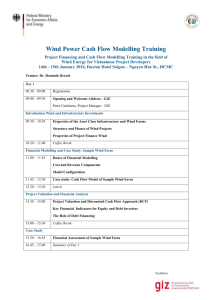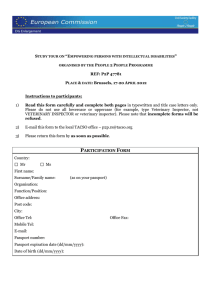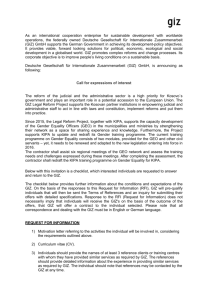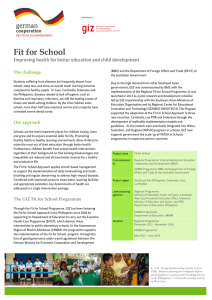Fit for School` project - World Medical Association
advertisement
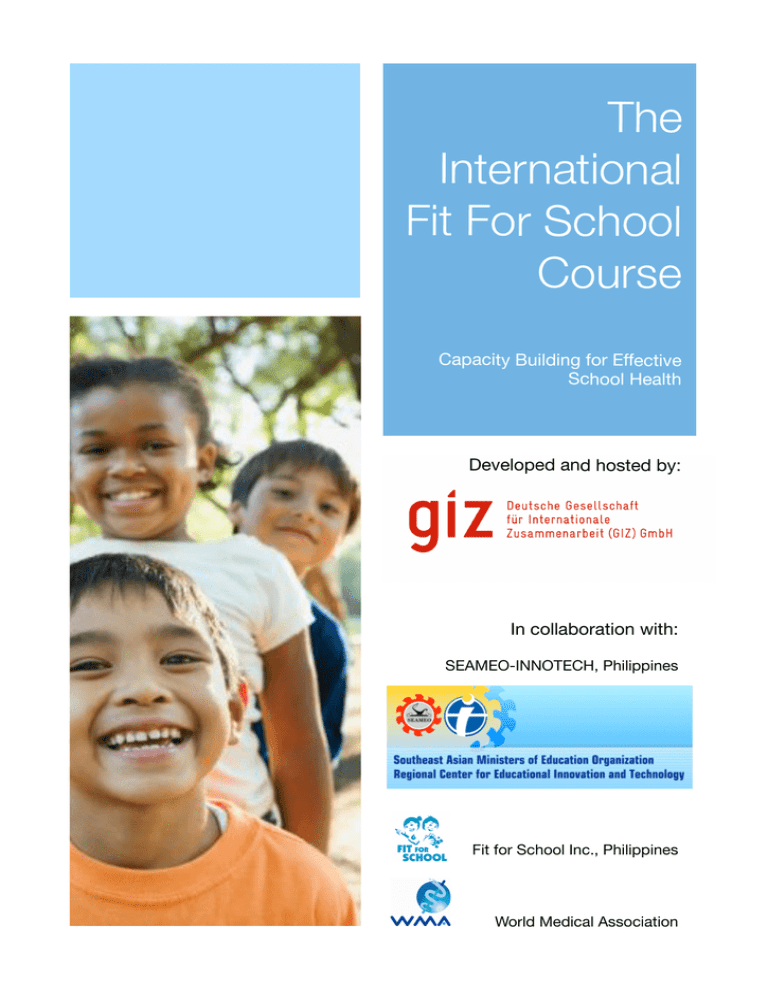
The International Fit For School Course Capacity Building for Effective School Health Developed and hosted by: In collaboration with: SEAMEO-INNOTECH, Philippines Fit for School Inc., Philippines World Medical Association Background Established on 1 January 2011, Deutsche Gesellschaft für Internationale Zusammenarbeit (GIZ) GmbH brings together under one roof the long-standing expertise of InWEnt, GTZ and DED. In order to address child health through comprehensive and integrated school health programmes, GIZ in close partnership with SEAMEO-INNOTECH (Manila) and Fit for School Inc. has developed the International Fit for School Course – Capacity Building in School Health, which is to be launched in April 2011. The cutting-edge and innovative course follows the model of the Fit for School Programme, a very successful school health programme from the Philippines. 2 Preventable infections and chronic diseases take a high toll on the child population globally, with more than 200 million children not reaching their full physical and cognitive developmental potential, and about 10 million dying per year from preventable causes. Child health and education are at the core of the Millennium Development Goals and form the basis for current international health and development efforts. It is in this context that international efforts and approaches to tackle childhood diseases have been intensified and that school health has seen a renaissance in the public health discourse as a most effective tool to improve health of children. Health promotion and health care interventions in school settings have been implemented in high-income countries for decades. Particularly in low- and middle-income countries, however, programmes remain limited in reach, or are not sustained by Aim of the Course To promote and facilitate effective school health programmes worldwide through building of conceptual, implementation and management capacity with governments, international organisations and NGOs in low- and middle-income countries appropriate budgets so that efforts often fade soon after implementation. The potential of schools to serve as community spaces promoting public health is largely unknown or underestimated by health and education decision-makers. However, school health programmes can contribute greatly to realise the right to health and education for children as recognised in the Convention on the Rights of the Child (1989) through tangible and focused action in schools, which become places of public health promotion and acquisition of life-long health and hygiene skills. Aim of the International Fit for School Course To promote and facilitate effective school health programmes worldwide through building of conceptual, implementation and management capacity with governments, international organisations and NGOs in low- and middle-income countries The course covers a broad range of topics related to effective school health programmes, from concept development to implementation, from child health to evidence-based interventions, and from day-to-day management to evaluation and monitoring. The course content will be applicable to different international settings, although the first courses will initially focus on countries of South-East Asia. Based on the internationally awarded Fit for School model emphasis will be put on practical and tangible support rather than on theoretical concepts. "Every child has the human right to education, health and security. The central role of schools is teaching and learning, but they are also a unique community resource to promote health and development for children, families and teachers. Education, health and other sectors must work together as partners to develop the full potential of young people, mitigating the impact of social and economic disadvantage." Tang et al., Health Promotion International (2009) 24:68-77 3 The Fit for School Programme – innovation, impact and leadership Fit for School is an integrated school health programme currently implemented in public elementary schools in the Philippines. The programme was awarded for "Innovation in Global Health" by the United Nations Development Programme (UNDP), the World Bank and the World Health Organization (WHO), in the context of the Global South-South Development Expo in Washington, USA, in December 2009. Other awards and recognitions (i.e. International Association for Paediatric Dentistry, Shils Award for Entrepreneurship in Education, best practice example in a recent World Bank publication on school health) confirm the international interest in this innovative programme. The programme was designed as a response to the alarming disease burden of the pupil population in all regions of the Philippines. The innovative cornerstone of the FFSP is the use of existing school structures for the implementation of a package of preventive health strategies. They consist of simple, evidence-based interventions that address the most prevalent diseases of children common to most low- and middle income countries: respiratory tract infections and diarrhoea (the two leading causes of childhood death and morbidity), soil-transmitted helminth infections (about 60% of children in the Philippines are infected by parasitic intestinal worms) and tooth decay (virtually all 6-yr-old children have untreated caries). The programme consists of: Daily supervised handwashing with soap; • Daily supervised toothbrushing with fluoride toothpaste; and • 4 • Semiannual de-worming of all children by supervised ingestion of an albendazole tablet. The programme currently reaches more than 1.5 million children in the Philippines and is the government's flagship programme. The model is highly modular, scalable and adaptable so that implementation in other settings and with other interventions and countries is facilitated. way of improving health and education of millions of children worldwide. The International Fit for School Course will contribute to improved action in school health programmes and provide a platform for active dialogue, exchange and mutual learning. For more information see: www.fitforschool.ph Partnerships & collaboration for better child development Developed, promoted and organised by GIZ on behalf of the German government, the International Fit for School Course will be run and implemented with international and local partners: SEAMEO-INNOTECH, Philippines, Fit for School Inc., and the World Medical Association (WMA); thus highlighting the important interrelations between health, education and general development. Renowned experts will present cutting-edge information and state-of the art content, all complemented by a hands-on field visit experience. The United Nation's MDG Summit in September 2010 highlighted with painful clarity that achieving all MDGs will require significantly increased efforts by all stakeholders. Strengthening effective school health programmes in low- and middle-income countries around the world is a cost-effective and high-impact "It is clear that without proper education, health suffers. And without proper health, good education is not possible." Gro Harlem Brundtland Former WHO Director General 5 Outline International Fit for School Course The course will consist of five major topic modules, each of them complemented by a number of learning modules. The learning style will be participative, interactive and focussed on practical group work. A field trip will allow participants to test and improve their practical skills. 1 2 3 4 5 6 The basics of health and public health for school managers and stakeholders Sick kids don't thrive What you need to know about public health What makes children sick and how to address it Education, health and behaviour a holistic approach School health - evidence base & learning from effective models What is Fit for School (Part 1) introduction to a successful model What is Fit for School (Part 2) international policy frameworks School health - what works and what doesn't Programme management - planning, implementing and sustaining effective school health programmes How to get started - project planning Who does what - effective intersectoral collaboration Making things work - advocacy, monitoring & evaluation, overcoming barriers Policy & governance - creating a supportive environment for school health programmes Practice - tools & techniques for managing effective school health programmes Formalising things - agreements, policies & contracts Do good an talk about it - effective communication & media work What next? Ensuring sustainability and large-scale impact Observing, recording, analysing situation analysis Action - using the Fit for School toolkit Practical details Course dates & venue The International FFS Course will be held on 4 to 14 April 2011 at the Soriano Hall, SEAMEO INNOTECH, Commonwealth Avenue, Diliman, Quezon City, Philippines. Participants are required to arrive at latest on 3 April 2011 and to leave on 15 April 2011. Cost of the course & accommodation The GIZ will cover the participants’ international travel and full board accommodation on single occupancy in comfortable guest rooms at the International House of SEAMEO INNOTECH. All other costs need to be covered by the participant. It is recommended to bring sufficient funds to pay for extra expenses. Air travel The GIZ will procure economy class airline tickets from: • The main capital city of the participant’s home country to Manila and back, or • For Filipino participants residing outside Metro Manila, the GIZ will refund the cost of transportation incurred in attending the training course and provide a similar amount for the participant’s return upon completion of training. • As a general rule, the participants must follow the schedules prescribed by GIZ with respect to their arrival prior to the commencement of the course and their departure upon the completion of the course. Any deviations in time schedule and/or return route must carry the approval of the Ministry of Education/Health of the participant’s home country and the consent of GIZ & SEAMEO INNOTECH as the case may be. travel insurance, though, or costs of visa, medical examinations, pre-existing diseases, or any loss or damage of personal belongings. Target group of the course The course participants will mainly come from Indonesia, Cambodia and Philippines. Their background will be from health, education and water & sanitation sectors as well as from other national, regional and international stakeholders. The target group consists of Senior Education Officials/Executives from the Ministry/ Department of Education responsible for developing and managing school-based health programmes, Senior Public Health Officials/ Executives from the Ministry/Department of Health responsible for developing and managing school-based health programmes, and Senior Officials/Executives from Non-Government Organizations involved in school health programmes. Each applicant is requested to complete the “Course Participant’s Application Form”. Please see attached. Attendance Participants are expected to have a 100% attendance to all the ten-day sessions and actively participate in the discussion and learning exchange. English proficiency The ten-day forum will be carried out using the English language, hence participants are expected to be able to converse in English and written reports are also required in English. Airport transfer Transfers to and from the airport will be provided by the GIZ through SEAMEOINNOTECH. Field trip The course includes a field trip to witness a school health programme in action and to train practical skills of participants. Passport & visas Non-Filipino participants must possess a passport for travel purposes which is valid for at least 6 months beyond the date of entry. Since the course is only for two weeks, no visas will be required pursuant to an Inter-ASEAN travel courtesy arrangement. Moreover, Circular No. 66-77 of the Philippine Department of Foreign Affairs provides for special travel arrangements for officials, course participants and guests of the GIZ in SEAMEO INNOTECH. Registration All participants are requested to fill in the applications form with all required details and send it back to the GIZ Health Officer in the Philippines at the following post or fax number or by email before March 1st, 2011, to: Insurance & hospitalisation Payment of premiums will be made by the GIZ to cover for emergency hospitalisation expenses due to accident injuries, under specific terms and conditions. This provision will not include Mrs. Cecil Benavidez GIZ Health Officer 43 Yakal Street Greenwoods Exe Village Cainta, Rizal Philippines 1900 Tel.: +63 2 6420754 Fax: +63 2 6421770 Mobile : +63 9175030347 e-mail: cecilbenavidez@yahoo.com 7 About GIZ Established on 1 January 2011, GIZ brings together under one roof the long-standing expertise of DED, GTZ und InWEnt. As a federally owned enterprise, GIZ supports the German Government in achieving its objectives in the field of international cooperation for sustainable development. GIZ offers demand-driven, tailormade and effective services for sustainable development and supports people and societies in developing, transition and industrialised countries in shaping their own futures and improving living conditions. Capacity building for partner-country experts is a key component of its services, and GIZ offers its programme participants diverse opportunities to use the contacts they have made. Deutsche Gesellschaft für Internationale Zusammenarbeit (GIZ) GmbH Friedrich-Ebert-Allee 40 53113 Bonn, Germany Fon +49 (0)228 - 44 60-0 Fax +49 (0)228 - 44 60-1706 Email health@giz.de www.giz.de About SEAMEO-INNOTECH SEAMEO-INNOTECH, the Regional Center for Educational Innovation and Technology is one of 19 regional specialist institutions forming the Southeast Asia Ministers of Education Organization (SEAMEO). It is principally dedicated to identifying common and unique education problems and needs of Southeast Asian countries and developing innovative and technology-based solutions to address these problems. The Center aids in educational development within and outside the region through its programme and service areas of 1) training and human resource development, 2) research and evaluation, and 3) information dissemination, and other special/capacity building programmes addressing specific areas of concern in the Southeast Asian education sector. SEAMEO INNOTECH facilitates teaching and learning through innovative and technology- based research and training solutions in order to fully develop the potentials of the people in Southeast Asia. www.seameo-innotech.org About Fit for School Inc. Fit for School Inc. is a Philippine Non-Governmental Organization (NGO) that works closely with the health and education sectors, various development agencies and private partners on effective school health programmes. It offers information, technical assistance and a high-level network to support the institutionalization of school health programmes. The NGO has spearheaded the award-winning concept of the Essential Health Care Programme (EHCP) that is the national flagship school health programme in the Philippines, currently reaching more than 1.5 million children www.fitforschool.ph About World Medical Association The World Medical Association (WMA) is an international organization representing physicians. The organization was created to ensure the independence of physicians, and to work for the highest possible standards of ethical behaviour and care by physicians, at all times. www.wma.net 8
